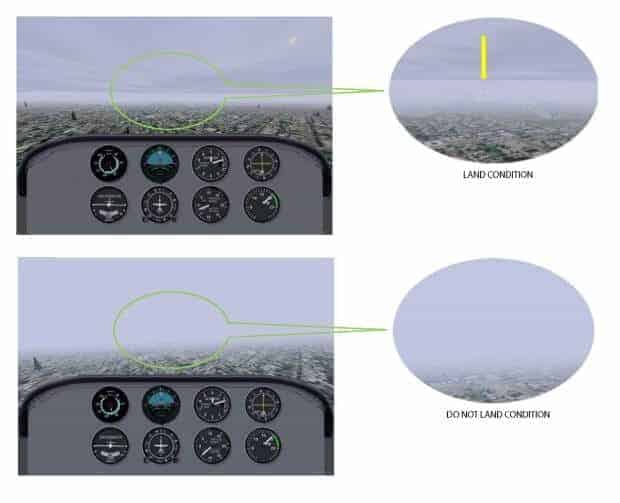A new study has found that expert pilots’ brains process visual data more efficiently, allowing them time to make better decisions when landing.
Landing an airplane is one of the most difficult piloting techniques to master, and the stats show it: 36 percent of all airplane accidents and 25 percent of fatalities occur during the final approach and landing.
New research by scientists at the Stanford University School of Medicine and the VA Palo Alto Health Care System reveals that expert pilots make better decisions during this phase than less experienced pilots because their brains behave more efficiently.
The study, published today in PLOS ONE, could lead to technology and techniques that guide pilots to more efficient brain behaviors in order to improve flight safety.
The researchers rigged a fMRI machine so that 20 pilots — 12 moderately experienced pilots and eight experienced pilots — could operate the controls of a flight simulator while having their brain activity scanned in real time. The simulator mimicked the cockpit of a single-engine airplane, and the pilots were instructed to land at a virtual San Francisco International Airport.
The trial started the pilots at 350 feet of altitude. They were instructed to begin their descent based only on their instrument readings, as would be typical in most real-life flights. Once they reached 200 feet — the altitude at which the Federal Aviation Administration mandates you must be able to clearly see the runway in order to land — the program would display the runway, either clearly or obscured by varying degrees of fog.
The pilots would then need to flash their gaze from the instruments to the runway and back to make a snap decision about whether or not it would be safe to continue the approach.
After multiple attempts per pilot, the results showed that the expert pilots made the correct decision about whether to make a landing attempt or abort 80 percent of the time, whereas the moderately experienced pilots did so only 64 percent of the time. Interestingly, the fMRI scans revealed that the expert pilots scored higher while displaying only half as much brain activity.
Landing a plane involves constantly scanning instruments as well as the view out the window, said Maheen Adamson, PhD, lead author of the study and a clinical associate professor of psychiatry and behavioral sciences at Stanford. Reduced neural activity in expert pilots indicates that they are able to complete the task at hand with fewer brain resources. She suspects that the brain’s ability to streamline multiple visual inputs is the result of experience.
“The data show that the expert pilot seems to just know what to look for, where to look and when to look,” said Adamson, who is also the director of research and PhD fellowships at the War Related Illness and Injury Study Center at the VA Palo Alto Health Care System. “And we’ve been able to trace that skill back to the caudate nucleus.”
This is an area of the brain involved in regulating gaze as the eyes quickly shift their focus to different fixed objects. The work needs to be replicated to confirm the caudate nucleus’s role in instrument scanning, Adamson added.
Other brain structures or mechanisms might be playing a role in visual processing for pilots. But this work opens the door to pairing fMRI and flight simulators — something that NASA is already doing in limited trials — to test pilots’ mental engagement during various flight maneuvers. Researchers might also be able to design interactive lessons that guide less expert pilots into behaviors that mimic the more efficient brain activity of more expert pilots.
“In the future, we could put a trainee in a scanner and see what mechanism in their brain they’re using to get better at the task, and train them to reallocate resources in the brain more efficiently,” Adamson said. “If we are able to train pilots to process instruments and other visual cues more efficiently, you could reduce the likelihood of accidents during landing.”
Although these findings were obtained by testing aircraft pilots, they may also have implications for skilled task performance and aging in general. Prior work in the same laboratory showed how slower speed of information processing predicts worse performance on aviation-related tasks in older pilots. The current research offers an insight into how more efficient brain activity and information processing may provide a countermeasure to loss of speed of processing with aging.


